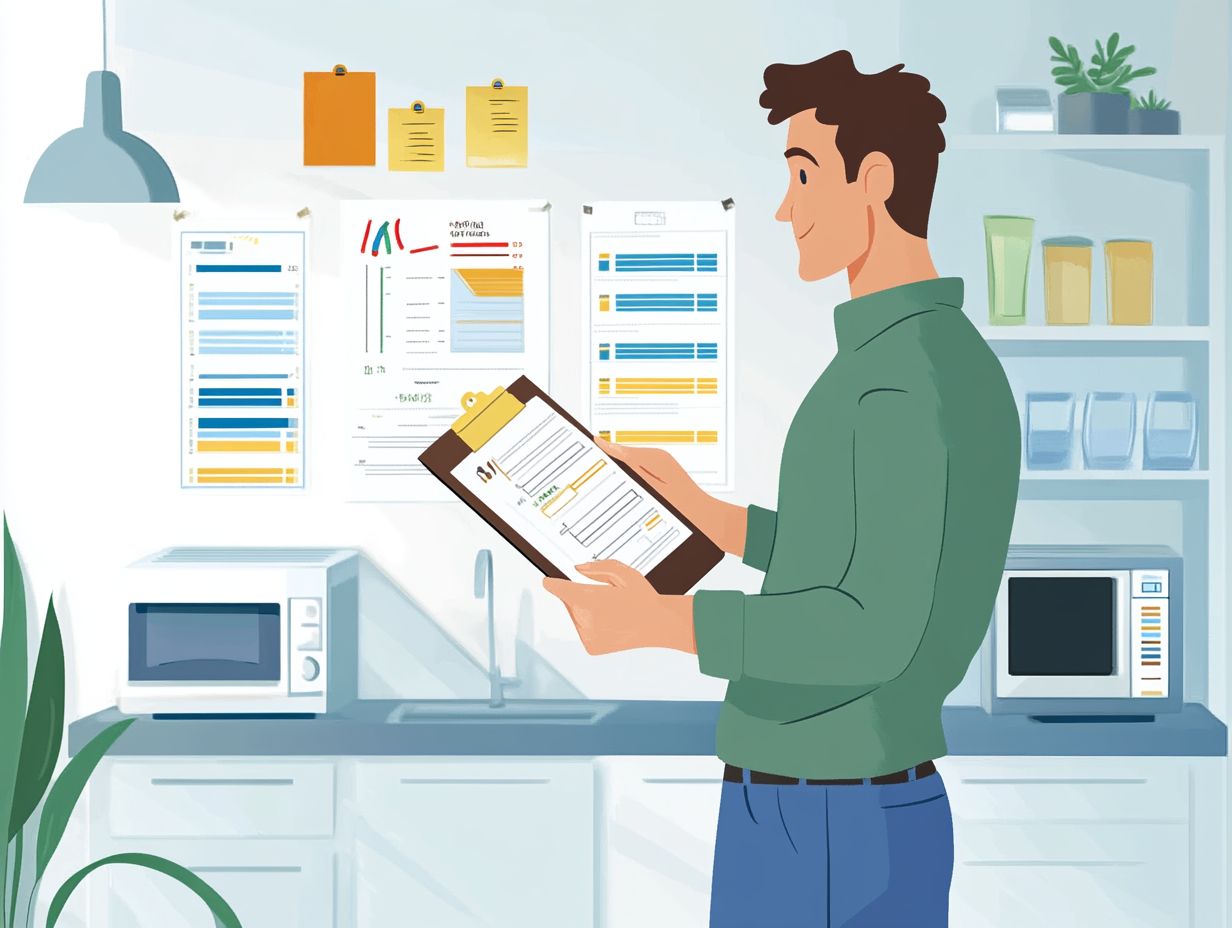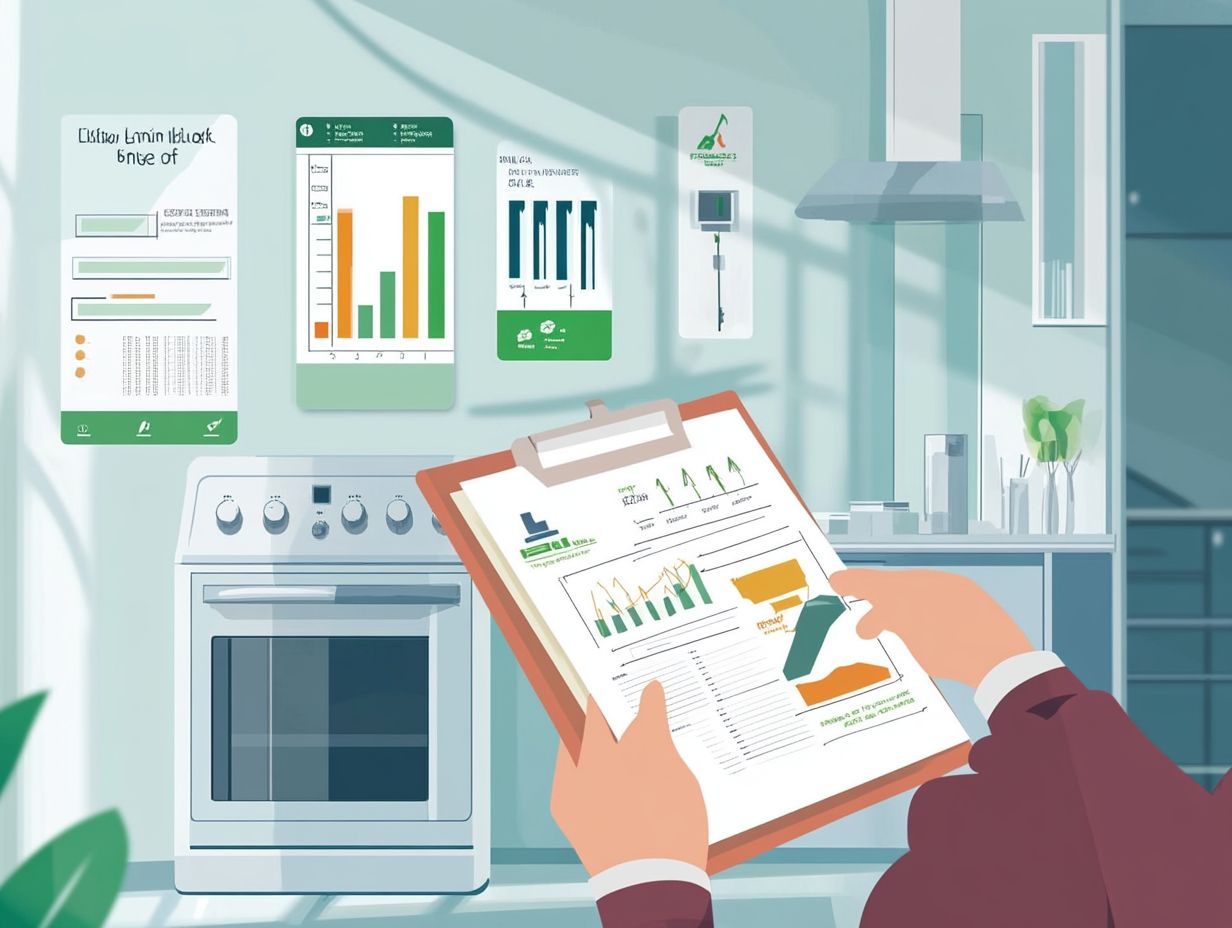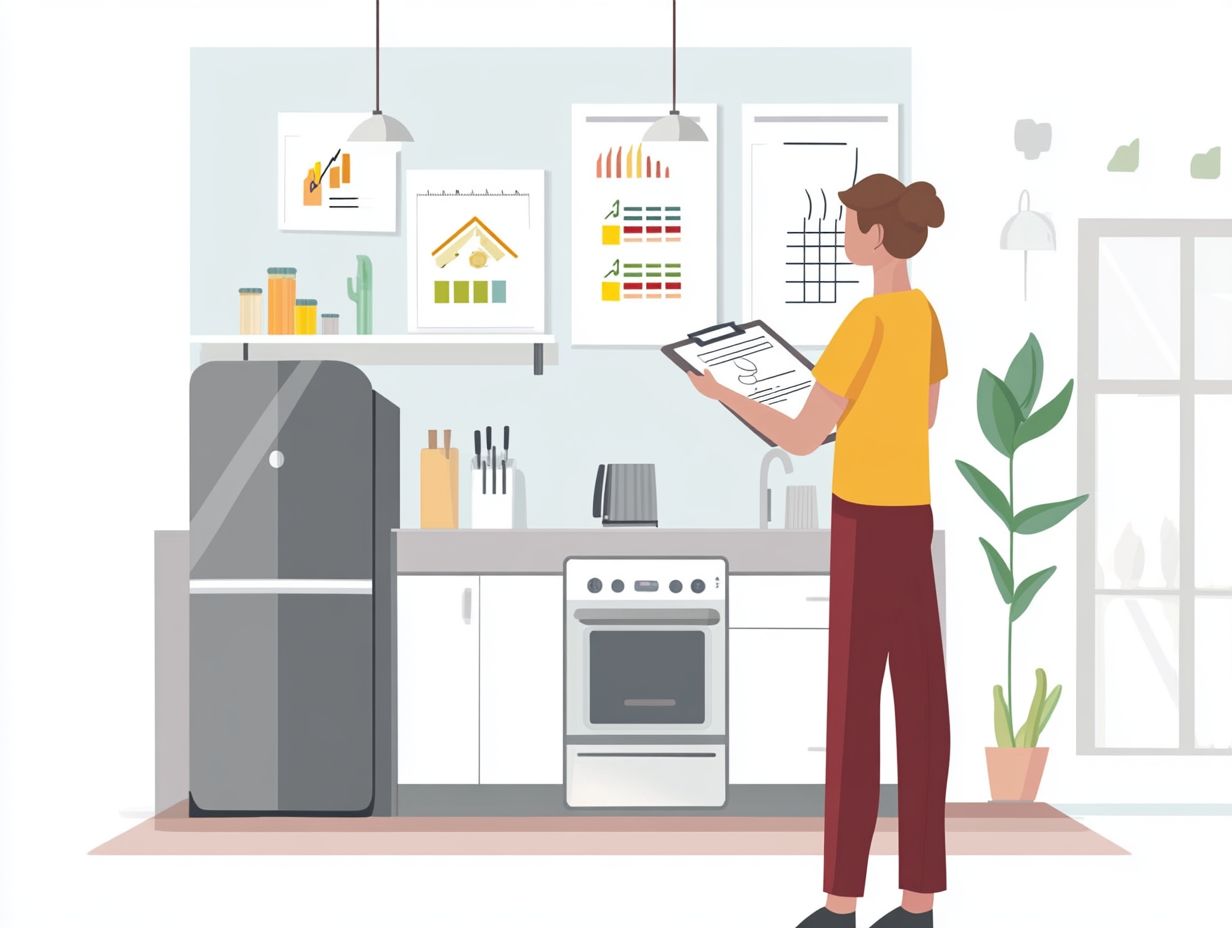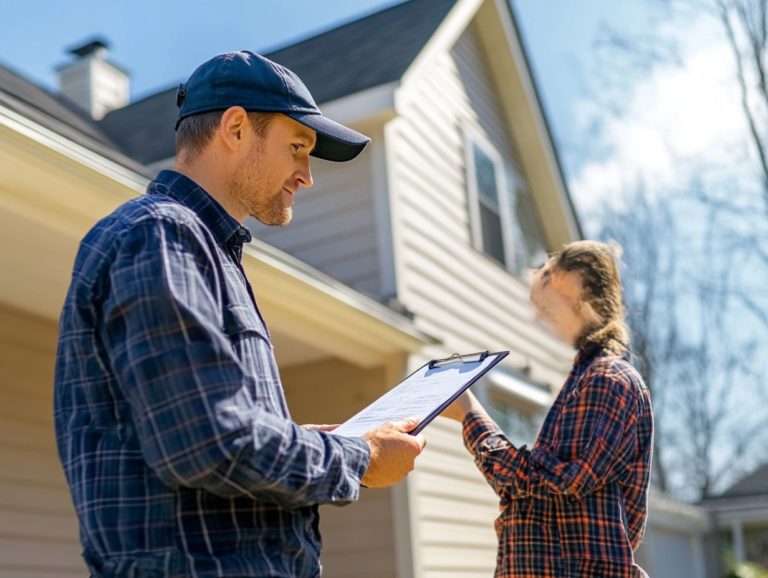Energy Audit Insights for New Home Buyers
When you re in the market for a new home, understanding its energy efficiency is essential. An energy audit will reveal how effectively the property uses energy and identify areas for improvement, leading to significant savings for you.
This guide walks you through the intricacies of energy audits. You ll learn about preparation, what to expect during the process, interpreting the results, and implementing energy-saving measures.
You ll also discover incentives for enhancing energy efficiency and tips for selecting the best appliances. Immerse yourself in this information to make informed choices for a more sustainable and cost-effective home.
Contents
- Key Takeaways:
- Understanding Energy Audits
- Preparing for an Energy Audit
- Interpreting Energy Audit Results
- Implementing Energy Saving Measures
- Considerations for New Home Buyers
- Frequently Asked Questions
- What is an energy audit and why is it important for new home buyers?
- How does an energy audit work?
- What are the benefits of getting an energy audit before buying a new home?
- How long does an energy audit take to complete?
- Do I need to be present during the energy audit?
- How often should I get an energy audit for my home?
Key Takeaways:

Understanding energy audits is crucial for new home buyers to make informed decisions on energy efficiency.
Preparing for an energy audit by gathering necessary information and knowing what to expect can lead to more accurate results.
Interpreting energy audit results helps new home buyers identify areas for improvement and implement cost-effective solutions for long-term energy savings.
Understanding Energy Audits
Understanding energy audits is essential for homeowners looking to enhance energy efficiency and lower their energy costs.
A home energy audit, performed by a certified energy assessor, involves a thorough examination of your property s energy use to pinpoint inefficiencies and suggest energy-saving solutions.
The process typically uses advanced energy assessment tools like infrared imaging and blower door tests to uncover issues like air leakage and heat loss.
This helps you make smart choices about energy upgrades, following guidelines from respected organizations like the U.S. Department of Energy and the Building Performance Institute.
What is an Energy Audit?
An energy audit is a detailed examination of your home’s energy consumption aimed at uncovering opportunities to enhance energy efficiency. This not only helps reduce your energy costs but also improves your overall comfort.
During this evaluation, various components like HVAC systems, insulation quality, and duct sealing are carefully inspected. By diving into these aspects, auditors can spot inefficiencies such as air leakage or significant heat loss that lead to high energy bills.
Addressing these issues lowers your monthly expenses and creates a more enjoyable living environment. You might also qualify for tax credits when you implement energy-efficient upgrades, making the shift to a more sustainable home even more appealing.
Investing in an energy audit is a pivotal step toward achieving financial savings while embracing environmental responsibility.
Benefits for New Home Buyers
As a new home buyer, understanding the benefits of a home energy audit can greatly influence your purchasing decisions, especially regarding long-term energy savings and preparing your home for an energy audit to boost your property’s value.
By identifying areas of inefficiency, an energy audit empowers you to make informed decisions and sets the stage for energy-efficient upgrades that significantly lower your energy bills over time.
Implementing improvements like programmable thermostats and energy-efficient appliances can reduce your energy consumption while enhancing your overall home comfort.
Homes with high HERS ratings, which indicate exceptional energy performance, tend to attract environmentally conscious buyers, increasing resale value.
Ultimately, conducting a home energy audit is a smart investment that provides both immediate and long-term rewards.
Preparing for an Energy Audit
Preparing for a home energy audit involves several essential steps to ensure a thorough and effective evaluation of your property s energy efficiency.
By following these steps, you can enhance energy savings and improve your comfort.
Ready to take the next step? Schedule your energy audit today for immediate benefits!
Gathering Necessary Information

To facilitate a thorough home energy audit, gather essential information about your energy consumption and bills. This information will provide valuable insights to the energy assessor.
This includes your previous energy bills, which show usage patterns over time. Also include details about any energy-efficient upgrades you’ve made, such as new appliances or insulation improvements.
A comprehensive overview of these elements helps the energy assessor pinpoint trends. This allows for specific areas to enhance efficiency.
Understanding prior upgrades helps the assessor evaluate how effectively your home has utilized past interventions. This results in tailored recommendations for further improvements.
The more detailed the information you provide, the more accurate and beneficial your energy assessment report will be.
What to Expect During the Audit
During a home energy audit, expect a thorough evaluation of your property, conducted by an energy assessor equipped with various assessment tools to pinpoint inefficiencies.
This process typically kicks off with a detailed walkthrough of your home, concentrating on areas where energy loss is most likely to sneak in.
One of the pivotal tests performed is the blower door test, which assesses the airtightness of your building. Infrared imaging reveals temperature fluctuations and identifies spots that may lack sufficient insulation.
You ll also receive assessments regarding air leaks, duct sealing, and the overall condition of your insulation materials. By grasping these elements, you can make informed decisions about improvements that will directly impact your energy consumption and lead to significant cost savings.
Interpreting Energy Audit Results
Interpreting the results of a home energy audit is crucial for homeowners like you. It serves as a detailed roadmap for enhancing energy efficiency and maximizing your long-term energy savings.
Understanding these findings enables you to make informed decisions that can lead to substantial benefits for both your wallet and the environment.
Understanding Energy Efficiency Ratings
Energy efficiency ratings, like the HERS rating, are essential for evaluating a home’s energy performance. They can significantly influence its market value and attractiveness to potential buyers.
These ratings are usually derived from thorough assessments that examine various factors, including insulation levels, heating and cooling systems, and the efficiency of appliances.
By grasping these ratings, you can pinpoint where energy loss is happening, making it simpler to prioritize upgrades. During energy audits, these ratings offer valuable insights into how much energy consumption can be curtailed, guiding you toward informed decisions about enhancements.
Ultimately, this approach not only translates to lower utility bills but also fosters a more sustainable living environment. Investing in energy-efficient upgrades becomes an appealing strategy for anyone keen on enhancing their property’s overall value.
Identifying Areas for Improvement
Identifying areas for improvement based on energy audit results is essential for enhancing your home’s energy efficiency and effectively reducing energy costs.
By focusing on common issues like air leaks, which can lead to considerable energy waste, you can take vital steps toward better efficiency. Upgrading insulation in attics and walls is another critical measure that helps keep conditioned air inside, lightening the load on your heating and cooling systems.
Optimizing your HVAC systems not only boosts occupant comfort but also significantly contributes to lower utility bills. By implementing these targeted energy-efficient upgrades, you ensure that you maximize your energy savings while cultivating a more sustainable living environment.
Implementing Energy Saving Measures

Taking action on energy-saving measures is a smart move! Reduce your costs and help the planet at the same time.
By enhancing your energy efficiency, you not only reduce your energy costs but also contribute to a more sustainable living environment.
This thoughtful approach allows you to enjoy the benefits of lower bills while playing a part in preserving the planet for future generations.
Cost-Effective Solutions for New Home Buyers
As a new home buyer, you can benefit from cost-effective solutions found during a home energy audit. Exploring energy audit strategies for older homes can lead to energy savings and increase your property’s value.
By upgrading to LED lighting, smart thermostats, and high-efficiency appliances, you ll lower your monthly utility bills. You ll also make your living space more comfortable.
Many of these upgrades are affordable and can qualify for federal tax credits, giving you financial relief.
For example, energy-efficient windows and insulation help maintain steady indoor temperatures. This can significantly lower your heating and cooling expenses.
Aligning these upgrades with your budget paves the way for a sustainable lifestyle while protecting your finances.
Long-Term Energy Savings
You can achieve long-term energy savings by consistently implementing energy-efficient upgrades. These improvements will lower your bills and support a sustainable lifestyle.
Focus on proper insulation, energy-efficient appliances, and smart home technology. These choices optimize energy consumption for a more comfortable living environment.
Establish an ongoing energy management plan that includes regular audits and maintenance. This proactive strategy keeps your efficiency intact.
Considerations for New Home Buyers
As a new home buyer, think about energy audits and their connection to home value for informed decision-making. This careful approach can lead to significant financial benefits and comfort in your new space.
Incentives and Rebates for Energy Efficiency
Incentives and rebates can lower the upfront costs of energy-efficient upgrades. These financial aids include state and federal tax credits, utility company rebates, and local government grants.
For instance, installations like solar panels and energy-efficient appliances often qualify for sizable tax credits. Check government websites, local utility providers, or energy organizations for available benefits.
By utilizing these incentives, you ll reduce your initial investment and enjoy long-term savings on energy bills. This makes these upgrades financially attractive.
Choosing Energy-Efficient Appliances and Systems

Select energy-efficient appliances and systems to maximize savings and enhance your home s performance. Consider energy consumption metrics and product ratings carefully.
Consumer reviews can provide insight into real-world performance, helping you understand long-term savings and reliability.
Prioritize products with Energy Star ratings. This ensures lower utility bills and promotes a sustainable lifestyle that benefits both your wallet and the planet.
Frequently Asked Questions
What is an energy audit and why is it important for new home buyers?
An energy audit assesses a home’s energy efficiency. It helps identify energy waste and suggests improvements to save money on utility bills.
This is crucial for new home buyers as it aids in making informed decisions about their new home.
How does an energy audit work?
An energy audit carefully checks how your home uses energy. A professional looks at insulation, heating and cooling systems, windows, doors, and appliances.
They use special tools to measure energy use and find areas for improvement. You’ll receive a detailed report with suggestions to save energy.
What are the benefits of getting an energy audit before buying a new home?
Getting an energy audit before buying a new home helps you save money in the long run.
By identifying areas for improvement, you can make informed decisions about necessary upgrades and potentially negotiate a lower purchase price.
It also helps you avoid unexpected energy costs and ensures a more comfortable, energy-efficient living environment.
How long does an energy audit take to complete?
The length of an energy audit varies based on the size and complexity of your home.
On average, the process takes about 2-4 hours. A more detailed audit might take longer, so it’s best to consult with the professional for a precise estimate.
Do I need to be present during the energy audit?
While you don t have to be present, it s recommended. Being there allows you to ask questions and understand the auditor’s findings better.
This knowledge helps you make informed decisions about any energy-saving upgrades suggested.
How often should I get an energy audit for my home?
Don t wait! Schedule an energy audit every 3-5 years to keep your home efficient and your bills low. The efficiency of your home can change over time.
If you ve made significant energy-saving upgrades or noticed a sharp increase in your energy bills, consider getting an audit sooner.






